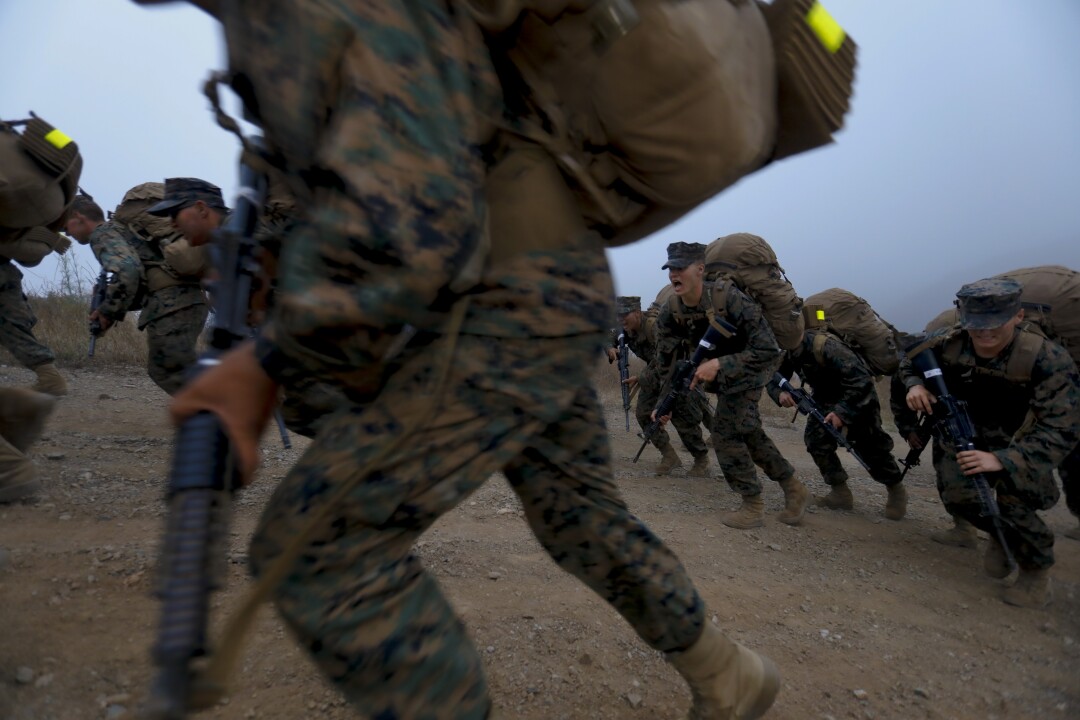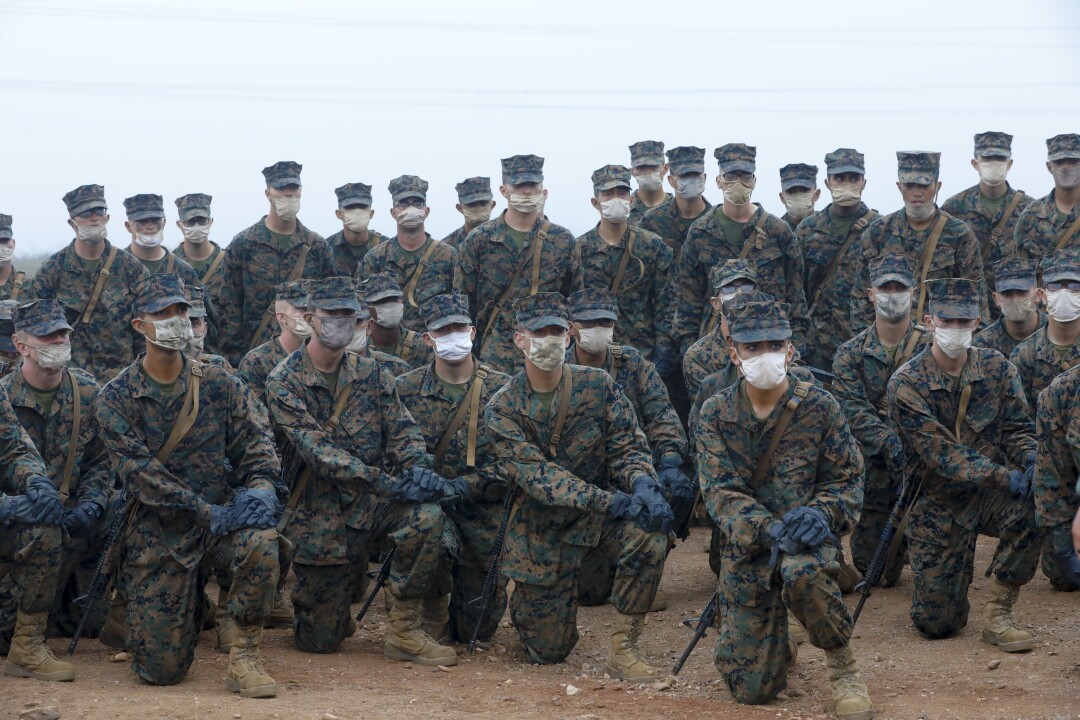Pvt. David Kelly roared at dawn Thursday as he charged up a foggy Camp Pendleton hillside affectionately called the Reaper carrying a 60-pound pack ahead of his recruit platoon.
The platoon, one of six that make up Bravo Company, was on the final hill of a grueling 2-day, 50-mile “Crucible” march, the last training evolution all recruits endure before earning the title “United States Marine.”
A traditional Eagle, Globe and Anchor ceremony awaited them on the other side of that hill.
Although countless recruits have done the same, Bravo Company is the first to do so after dozens of recruits — including Kelly — contracted and recovered from COVID-19.

Recruits from Bravo Company quickly advance to the top of the last hill of the Reaper, during the 3-day Crucible event. At the completion of the Reaper on Thursday, recruits are presented with their Eagle, Globe and Anchor pin, officially earning the title to be called a U.S.Marine.
(Nelvin C. Cepeda / The San Diego Union-Tribune)
The April outbreak in Bravo Company, reported by the Union-Tribune, led to the quarantine and isolation of all 237 members, delaying their training by weeks.
Having arrived at the depot March 30, the company was supposed to graduate June 26. Instead that will happen on July 24.
The outbreak caused the Corps to rethink how it trains recruits in the midst of a global pandemic. Since COVID-19, incoming recruits must now sequester at a local hotel for two weeks before beginning training.
Recruits and drill instructors also wear masks and are supposed to keep socially distant. Bunks are spaced farther apart.
Kelly’s roar as he ascended the hill came weeks after the worst day of his life.
On April 27, Kelly, 22 and ill with COVID-19, received word that his mother, 52-year-old Cheryl McCullough, had died of cancer. Compounding his grief was knowledge that he could not travel home to Wichita, Kan. for her funeral due to his illness.

David Kelly (c) and his fellow Marines celebrate earning their Eagle, Globe and Anchor pin after completing the crucible on Thursday at Camp Pendleton.
(Nelvin C. Cepeda / The San Diego Union-Tribune)
He thought of giving up, he said. The Marines had offered to let him out of his enlistment.
But the former college wrestler had already been dropped from Officer Candidate School. He didn’t want to abandon his goal of becoming a Marine, he said.
The day after his mother died, Kelly woke up and saw a small, purple bud on a barren tree outside the 2nd-floor window of his isolation room, in the Bachelor Enlisted Quarters. Purple was his mother’s favorite color, so he took it as a sign.
“It kind of gave me hope that things are going to get better and that my mom’s always going to be with me no matter where I go in life — that I’m still on the right path,” Kelly said after the company’s Eagle, Globe and Anchor ceremony. “It was kind of like my mom saying that I can get through it, and she’s going to be here with me every step of the way.”

David Kelly holds the coveted Eagle, Globe and Anchor pin that he was presented with on Thursday from his Drill Instructors.
(Nelvin C. Cepeda / The San Diego Union-Tribune)
In early June Kelly had been ill for about a week with many of the COVID-19 symptoms that are now so well known — exhaustion, trouble breathing and loss of sense of taste. Now he is fully recovered.
Col. Matthew Palma, commanding officer of the San Diego recruit training regiment, participated in the hike with the new Marines, carrying a 60-pound pack as they did.
Palma counseled Kelly during his quarantine. After Kelly’s mother died, he met with the Marine from outside his window and prayed with him.
Palma praised Kelly’s selflessness later during an interview. He said Kelly, not wanting to burden his family while his mother was ill, had refused the privilege of extra phone calls home.
“He said, ‘I can handle this,’” Palma said. “What (Kelly) didn’t know was that she was going to pass while he was in isolation. (Afterward), I asked him what he wanted to do — he said ‘Sir, I’m not leaving this place until I become a Marine.’”
Palma said the adversity of the outbreak brought this company together.
“I’m very, very proud of these young men that have been through so much adversity,” he said. “Up to this point, it’s likely the most adversity that they’ve experienced in their young lives. It’s certainly the case for Pvt. Kelly.”

Marines listened to Cpt. Adam Watson as he spoke about the history and legacy of the Marine heritage. Recruits on Thursday completed the 3-day crucible event that ends with earning their Eagle, Globe and Anchor and the title, U.S. Marine.
(Nelvin C. Cepeda / The San Diego Union-Tribune)
Palma said there were questions about whether long-term effects from the virus might affect the recruits, but none were held back from training for reasons related to the coronavirus.
“It was questionable as to whether or not they could do it,” he said. “I would attribute this success to not only their own personal strength but to the bond they formed with their drill instructors. It was like nothing I’ve seen in any other company before or after that because of that shared hardship.”
Eleven more companies have reported to the depot since Bravo, all of which undergo at least two weeks of isolation at an off-base hotel. Two are there now.
After basic training, recruits will be separated and go on to further training commands before officially joining the fleet.
The Marines never disclosed exactly how many members of Bravo Company ultimately tested positive, but a spokesman said at the time that the numbers were comparable to similar outbreaks among young military members in close quarters, such as those on the aircraft carrier USS Theodore Roosevelt and the guided-missile destroyer USS Kidd. On those ships, up to 25 percent of service members tested positive.
In the majority of the cases among Bravo Company, recruits showed no symptoms and were only identified as having the virus after 100 percent of the company was tested, according to a depot spokesman.
On Tuesday, Maj. Gen. Bill Mullen, the head of the Marine Corps Training and Education Command, said hundreds of recruits across the Corps’ two boot camps in San Diego and Parris Island, S.C. contracted COVID-19, but that had not disrupted training. East Coast recruits undergo the same two-week quarantine as those on the West Coast.
"complete" - Google News
July 11, 2020 at 03:03AM
https://ift.tt/3iPIFr3
San Diego's Bravo Co. Marine recruits recover from COVID-19, complete boot camp milestone - The San Diego Union-Tribune
"complete" - Google News
https://ift.tt/2Fvz4Dj
https://ift.tt/2YviVIP

No comments:
Post a Comment